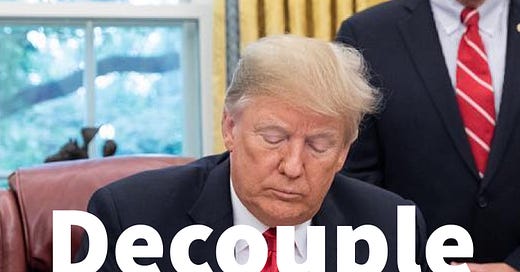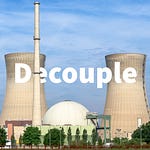Phil Chaffee, Editor of Nuclear Intelligence Weekly and Bureau Chief of Energy Intelligence’s New York offices, joins me to discuss the implications of a second Trump administration on U.S. nuclear energy policy. Will the tantalizing nuclear power purchase agreements signed by hyperscalers evaporate as carbon pricing becomes less likely? Will free-market ideology manage to sustain the government support needed to deploy nuclear power at scale? We speculate about these questions and more.
Note: This interview was recorded on 20 November 2024.
Watch now on YouTube. Listen to Decouple on Spotify and Apple.
In a nutshell
In this episode, we explore how a second Trump presidency could impact the U.S. nuclear energy industry, particularly regarding key policies like the Inflation Reduction Act and Department of Energy loan programs.
We talk about
The centrality of the Inflation Reduction Act and the DOE Loan Programs Office to the revitalization of the U.S. nuclear sector
Potential impacts of a Trump 2.0 presidency on U.S. nuclear energy policy, including possible fates for the Inflation Reduction Act and DOE loan programs
Trump's cabinet nominations, such as Liberty Energy CEO Chris Wright
The tension between the need for state support for nuclear power projects and free-market ideology
The hurdles the second Trump administration might face to its attempts to change energy policy, as well as the impacts it could have short of repealing legislation
Whether the attitudes of tech companies toward funding nuclear projects will change amid a less climate-concerned policy environment
The potential impacts of U.S.-Russia relations regarding nuclear fuel
“Policy is everything here. It is absolutely behind a lot of the big tech interest [in nuclear energy] we’ve seen... There is going to be an uncertain period of time where we wait to see what way the policy winds shift in the coming administration.”
– Phil Chaffee, Editor of Nuclear Intelligence Weekly
Deeper Dive
Under the Biden administration, the Inflation Reduction Act (IRA) created unprecedented support for nuclear power through production tax credits and investment tax credits. This policy framework has been crucial for keeping existing plants operational and encouraging new developments.
The Department of Energy's Loan Programs Office (LPO) has been particularly important, providing billions in financing for projects like the Vogtle nuclear plant and supporting initiatives like the Palisades restart. Under Trump's first term, the LPO operated without a Senate-confirmed director and was less active in new lending, though it continued supporting existing commitments.
A key tension exists between two competing visions for nuclear deployment: one involving significant government support for fleet deployment of AP1000 reactors, and another emphasizing deregulation and market-driven advanced reactor development. The appointment of Chris Wright as Energy Secretary suggests a free-market approach, though his previous support for nuclear energy—for instance, signing the "Declaration of Oil & Gas Executives in Support of Nuclear Energy" letter in March 2023—indicates potential industry backing.
The international dimension is crucial, particularly regarding competition with Russia and China in nuclear exports. Recent developments in U.S.-Russia relations, including Russian restrictions on enriched uranium exports and U.S. import bans, highlight the complex interdependencies in the nuclear fuel supply chain.
Among the biggest questions now is whether tech companies or "hyperscalers" will stand behind the high Power Purchase Agreement prices they have recently offered for nuclear power. With eventual carbon-pricing mechanisms less likely under a Trump administration, the economic rationale for investment in future low-carbon energy supplies may have weakened.
References
Inflation Reduction Act (IRA)
Keywords
nuclear energy policy, Trump administration, Inflation Reduction Act, DOE loan programs, nuclear exports, AP1000 reactors, energy security, nuclear fuel supply, tech companies, energy policy, nuclear renaissance, Russian sanctions, uranium enrichment













Share this post